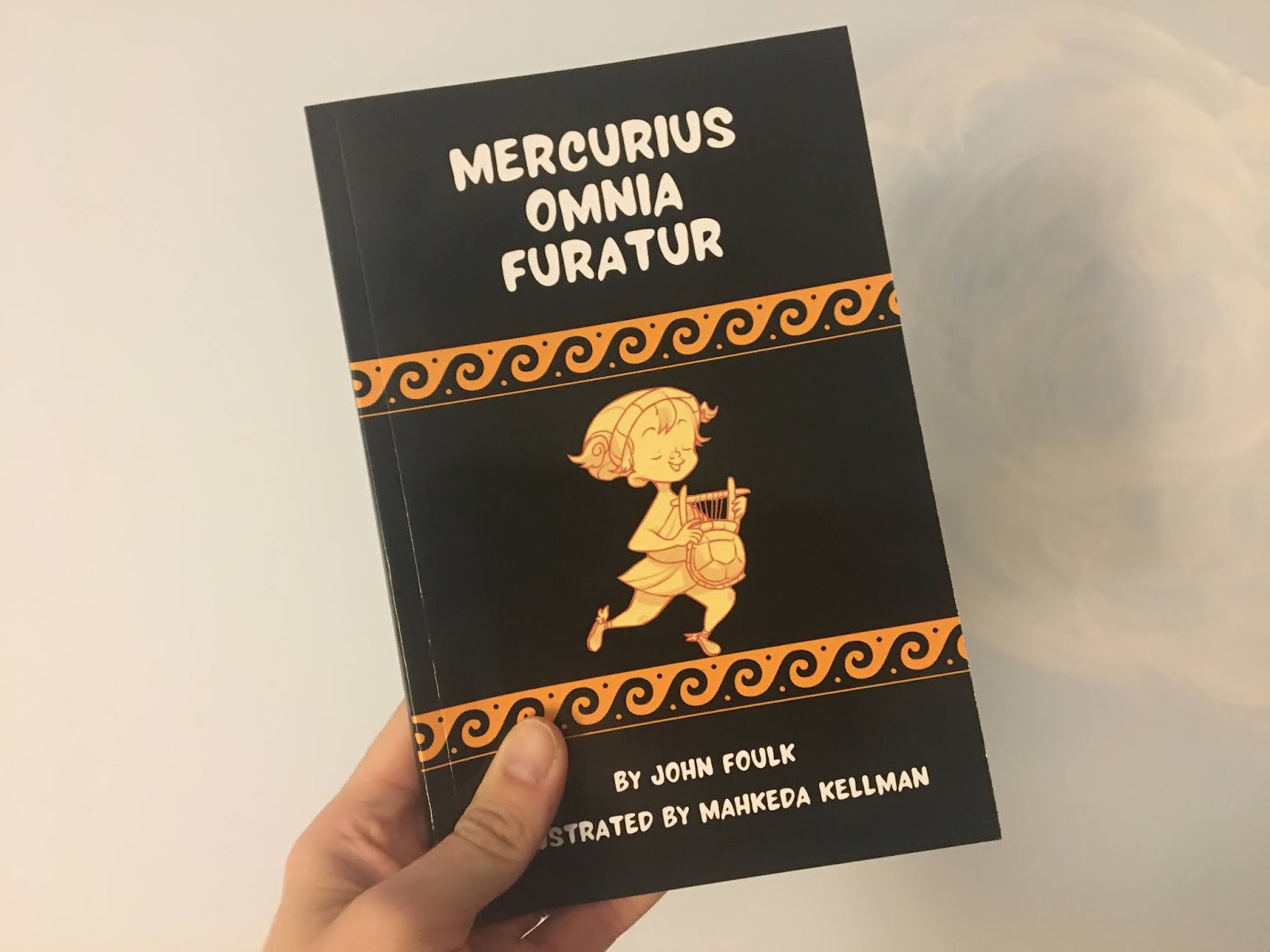Mercurius Omnia Fūrātur
 Mercurius Omnia Fūrātur (Mercury Steals Everything) is a sheltered-vocabulary Latin novella published by John Foulk in 2020. It tells the story of the infant Mercury, who is constantly stealing the belongings of the other Olympian gods. It is notable for its low word count and very short, simple sentences, and for its cute plot and illustrations.
Mercurius Omnia Fūrātur (Mercury Steals Everything) is a sheltered-vocabulary Latin novella published by John Foulk in 2020. It tells the story of the infant Mercury, who is constantly stealing the belongings of the other Olympian gods. It is notable for its low word count and very short, simple sentences, and for its cute plot and illustrations.Available from Amazon. Also available in Greek under the title Ἑρμῆς πάντα κλέπτει, found at Lulu.
Reading level
The author’s introduction states that this novella is intended for first-year novice learners. As of this writing, it is not yet rated by Comprehensible Antiquity.
Diverse & Multicultural Identities
For information about how representation of multicultural and diverse identities is analyzed in LNDb, see here.Parallel cultures
No depictions identified.Gender
Features one cis male main character (Mercury). Features no cis female main characters or transgender main characters.Sexual identity
Features a depiction of heterosexual identity: Mercury has a father and mother.SES/class
No depictions identified.Religion
No depictions identified.Disability
No depictions identified.Language Statistics
Vocabulary
Word List
A complete word list for Mercurius Omnia Fūrātur can be found here.
Glosses
This novella contains glosses in the form of footnotes with English translations.
Of the 80 unique words (not counting proper nouns) used in the text, 17.0 of them (21.2%) are glossed at their first appearance in the text. Of the 1484 total words in the text, 25.0 of them (1.7%) are glossed.
Of the 80 unique words (not counting proper nouns) used in the text, 17.0 of them (21.2%) are glossed at their first appearance in the text. Of the 1484 total words in the text, 25.0 of them (1.7%) are glossed.
Glossary
This novella contains a Latin-English glossary, with every form of each word listed separately. The glossary is complete.
Syntax
The ratio of complex sentences indicates what proportion of the total sentences are complex sentences, on average. A complex sentence is defined as a sentence with one or more subordinate clauses or verb phrases.
Summary
Genre & Sources
This novella is in the genre of mythological (Classical).
Its introduction states that it is primarily based on the Homeric Hymn 4 to Hermes, Lucian’s Dialogues of the Gods 11, among other sources.
Its introduction states that it is primarily based on the Homeric Hymn 4 to Hermes, Lucian’s Dialogues of the Gods 11, among other sources.
Complete Plot Summary
CONTAINS SPOILERS
The god Mercury is born to Jupiter and Maia. He finds a turtle and makes a lyre out of its shell. He sees a flock of cattle belonging to Apollo, and steals them by driving them into a cave. Apollo confronts Mercury, who denies stealing the cattle. They go to their father Jupiter on Olympus. While there, Mercury steals Apollo’s bow and arrows, Neptune’s trident, Mars’s sword, Venus’s belt, Vulcan’s tongs, and Jupiter’s scepter. The gods decide that Mercury should be given a toy to keep him out of trouble. Vulcan makes him the caduceus, and gives it to him in exchange for Mercury returning all the stolen objects, including Apollo’s cattle. Mercury gives his lyre made from the turtle shell to Apollo.
First 100 Words
Underlined words are glossed in the text.Hodiē puer nātus est. Hic puer est fīlius Iovis et Māiae. Māia est māter puerī. Iūppiter est pater puerī. Iūppiter est rex deōrum.
Hic puer est mīrus. Hic puer ambulāre potest. Hic puer loquī potest. Hic puer canere potest. Nōmen puerō est Mercurius.
Hodiē Mercurius in Cyllēnē monte nātus est. Mercurius cum mātre habitat. Mercurius cum patre nōn habitat. Nam Iūppiter in Olympō monte habitat. Mercurius est puer mīrus. Mercurius domō exīre vult. Mercurius loquī vult. Mercurius canere vult. Mercurius autem vult fūrārī.
Mercurius clam domō exit.
Mercurius: “Ego volō domō exīre! Ego volō fūrārī!”
Mercurius videt testūdinem!
Mercurius: “Ego volō habēre testūdinem!
Supplementary Materials
If you have resources for Mercurius Omnia Fūrātur and would like to share them on LNDb, please contact me.Presentation
| Illustrations? | yes |
| Illustrator | Mahkeda Kellman |
| Macrons? | yes |
| Font | Sorkin Type |
| Pages of story | 48 |
| Total pages | 68 |
| Chapters | 9 |
Key Information
| Publication date | July 20, 2020 |
| Publisher | Independently published |
| ISBN | 1735193704 |
| ISBN-13 | 978-1735193700 |

